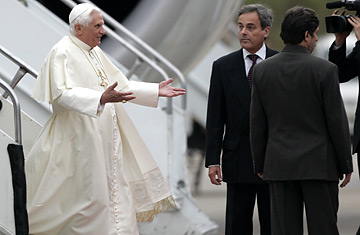
Pope Benedict XVI descends from a plane after arriving to the air base in Sao Paulo, Wednesday, May 9, 2007, in his first trip as pontiff to Latin America.
On Wednesday, as he flew toward his much anticipated five-day trip in Brazil, the Pope addressed the question of the "good standing" of Catholic politicians who support abortion rights — a delicate issue that has come up in the U.S., Europe and, most recently, Mexico. During an unprecedented 25-minute on-flight press conference, Benedict left little room for interpretation: pro-choice politicians not only should be denied communion, but face outright excommunication from the Church for supporting "the killing of a human child." The Pope's declaration came in response to recent comments from the spokesman of the Mexican bishops conference, who said politicians who pushed through a new Mexico City pro-choice law were to be excommunicated.
Standing before an Alitalia cabin full of reporters, two hours into the 12-hour flight to Sao Paulo, the Pope expressed his support for the Mexican bishops in the face of that country's first-ever law legalizing first term abortions. "Yes, that they are excommunicated isn't something arbitrary. It's envisioned in the law of the Church that the killing of a human child is incompatible with being in communion with the body of Christ."
Vatican spokesman Rev. Federico Lombardi was quick to clarify that the Pope wasn't excommunicating anyone, and that he did not mean to contradict a recent Vatican document that left it to the conscience of individual politicians to leave the Church on their own if they vote against its teachings. Canon law states that people who participate in abortions — would-be mothers, doctors, nurses — are automatically excommunicated. There has been an ongoing debate about whether this also applies to politicians who vote for abortion legislation. But the Pope's remarks seemed to be a moment of personal candor, leaving no doctrinal wiggle room for pro-choice Catholic politicians. It remains to be seen how it plays out with individual priests and the political leaders in their diocese — and whether it will become an issue in the 2008 Presidential campaign for candidates such as Rudy Giuliani.
The issue of politicians and abortion had also come to the attention of the current Pope in 2004 when John Kerry, a practicing Catholic and supporter of abortion rights, was the Democratic candidate for President, and then Cardinal Joseph Ratzinger was head of the Vatican's doctrinal office. At the time, in the heat of the campaign for the White House, several U.S. bishops had declared that pro-choice politicians like Kerry should be denied the rite of Holy Communion at Catholic Mass. When he was formally asked for doctrinal counsel on the matter, Cardinal Ratzinger wrote a carefully worded letter to the U.S. bishops conference that simultaneously reaffirmed strict Catholic opposition to abortion, yet urged Church leaders to do their best to avoid getting involved in electoral politics.
Still, the measured response from Rome did not make the issue go away, and in the three years since, the question has also flared up in Spain, Italy, and now in a dramatic way, in Mexico. Such open talk of "excommunication" was hardly a recipe for a soft landing on Benedict's first trip to Latin America, home to half the world's billion Catholics. Still, the 80-year-old Pope tried to strike positive notes through the rest of the surprisingly freewheeling encounter with the 70 or so reporters on board. He broke into a smile when a Brazilian reporter wondered if the German Pope has overlooked Latin America in the first two years of his papacy. "I love Latin America very much," Benedict said. "I know the great problems and [also] the human richness of this continent. It's the biggest Catholic continent and therefore the biggest responsibility of the Pope. So I am happy that the moment has finally arrived for me [to come]. Of course this Catholic continent must be an exemplary continent, where the human problems are resolved together with its bishops and priests so that this great Catholic continent is also a continent of life and of hope." The Pope acknowledged the need for the Church to respond to the challenge of evangelical Christian movements, which have been luring Catholics away with their more immediate approach to faith. Catholicism, he said, must be "more missionary and more dynamic in offering a response to this thirst for God."
With the recent pro-choice legislation in Mexico, and calls for a referendum on the issue in Brazil, the question of abortion — long banned across the continent — quickly moved to the center of the Pope's arrival in Latin America. "Life is a gift. Life is not a threat," Benedict said on the plane. "The roots of this legislation lie in a certain selfishness on one hand and on the other hand a doubt about the value of life, about the beauty of life and also a doubt about the future. The Church must respond above all to these doubts." Telling pro-choice Catholic politicians that they risk excommunication leaves no doubt how fiercely the Pope is prepared to fight against abortion.
